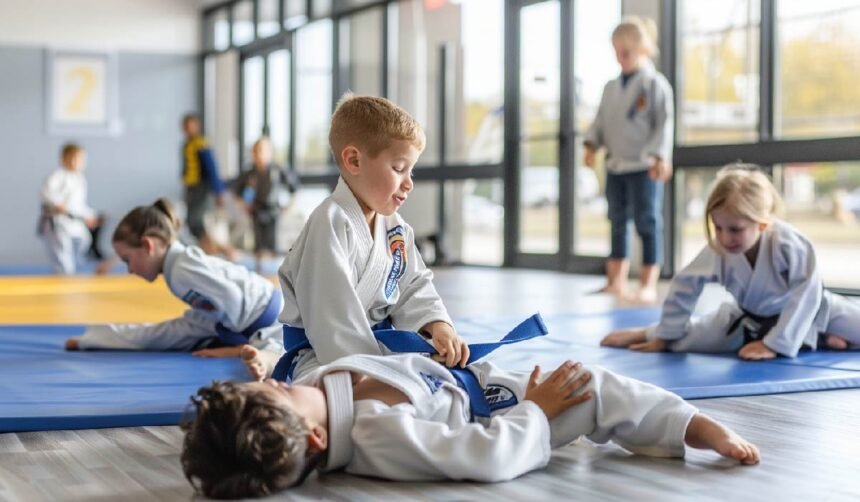For parents, one of the biggest challenges is helping children learn how to manage their impulses, regulate their emotions, and make thoughtful choices. These skills are all part of self-control, a quality that can shape not only a child’s behavior in the moment but also their long-term success in school, relationships, and life. While it is not always easy to teach kids self-control in everyday settings, Brazilian Jiu-Jitsu (BJJ) offers a powerful environment where these lessons are naturally reinforced.
In every class, children are asked to balance energy with focus, power with restraint, and independence with respect. Over time, this balance transforms into habits that carry far beyond the mat. Here are some of the most important self-control lessons every child can learn through Brazilian Jiu-Jitsu.
1. Patience Creates Progress
Children often want results right away. They want to win, to master a skill instantly, or to prove themselves quickly. In Jiu-Jitsu, progress is slow and deliberate. Techniques must be repeated hundreds of times to feel natural, and belts are earned only after consistent dedication. This teaches kids that lasting progress requires patience and that rushing only leads to mistakes. With each small step forward, they begin to see the value of persistence over instant gratification.
2. Calm Under Pressure Wins the Match
Rolling, or sparring, is like a physical puzzle. Kids are placed in situations where they might feel stuck or pressured. Instead of panicking, they are guided to breathe, think, and use technique. Staying calm under pressure is a form of self-control that translates directly into everyday life. Whether facing a tough test at school or navigating a stressful social moment, children who train in BJJ learn to pause, center themselves, and make thoughtful choices.
3. Respecting Rules and Boundaries Matters
Self-control is not just about managing yourself but also respecting others. On the mat, children quickly discover that rules keep everyone safe. They learn not to use excessive force, to stop immediately when a partner taps, and to follow the guidance of their instructors. These boundaries reinforce the idea that rules are not restrictions but safeguards, and respecting them shows maturity and care for others.
4. Strength Without Control Is Not True Strength
One of the most valuable lessons in Jiu-Jitsu is that using raw power alone is rarely effective. A smaller, calmer student who applies technique will often succeed against a larger child who relies only on strength. Kids begin to see that control of their body and emotions is far more important than aggression. This helps prevent overreactions in real life and teaches them to channel their energy productively instead of recklessly.
5. Knowing When to Step Back Is a Strength
In BJJ, tapping out is a normal and healthy part of training. It is how students acknowledge that they have been caught in a technique and need to reset. Far from being a sign of weakness, tapping shows intelligence and awareness. It teaches kids that knowing when to stop, step back, or try again is part of growth. In daily life, this translates into recognizing when to walk away from conflict, admit a mistake, or take a break before emotions get the best of them.
6. Focus Makes the Difference
Every technique in Jiu-Jitsu requires attention to detail. If a grip is off or a hip is in the wrong place, the move will not work. Kids quickly learn that paying attention is the difference between success and frustration. The discipline of focusing during class builds their ability to concentrate on schoolwork, chores, or conversations at home. In a world filled with distractions, this skill is one of the most valuable gifts BJJ provides.
7. Self-Control Helps Prevent Bullying
One of the most misunderstood aspects of martial arts is the fear that learning techniques might make kids more aggressive. In reality, the opposite is true. Jiu-Jitsu places a strong emphasis on ethics, responsibility, and using skills only for protection, never for harm. Children who once felt powerless gain confidence that makes them less likely to be bullied, while children who may have shown aggressive tendencies learn that hurting others is not a path to respect. Instead, they practice de-escalation, cooperation, and respect for every partner they train with.
8. Teamwork Builds Accountability
Even though Jiu-Jitsu looks like a one-on-one sport, improvement is only possible with the help of training partners. Kids learn to support one another, take turns, and communicate clearly during drills. They quickly realize that being careless or selfish disrupts the learning for everyone. This sense of accountability helps them develop empathy, responsibility, and a deeper awareness of how their choices affect others.
9. Consistency Is the Key to Mastery
Self-control also means showing up even when it is not easy. Jiu-Jitsu teaches that progress comes from consistent practice, not from occasional effort. Children discover the importance of committing to a routine, honoring their responsibilities, and putting in effort even when they feel tired or distracted. These habits extend into other areas of life, from homework to household responsibilities.
10. Respect Is Part of Self-Control
At its core, BJJ is built on respect. Kids bow when they enter the mat, they greet instructors with courtesy, and they treat their partners with care. This culture of respect teaches children to control their words, their actions, and their impulses in order to maintain harmony. Over time, they begin to carry this respect into their interactions at school, at home, and in their friendships.
Final Thoughts
Self-control is not something kids develop overnight. It takes guidance, practice, and the right environment. Brazilian Jiu-Jitsu offers all of that in a structured, engaging, and supportive way. Through patience, respect, calm focus, and resilience, kids discover that the greatest victories come from mastering themselves first.
At ARKA School of Jiu-Jitsu, our goal is to provide children with not just the tools for self-defense but also the lessons that shape strong character. The self-control they build on the mat becomes a foundation for confidence, discipline, and respect that lasts a lifetime.









